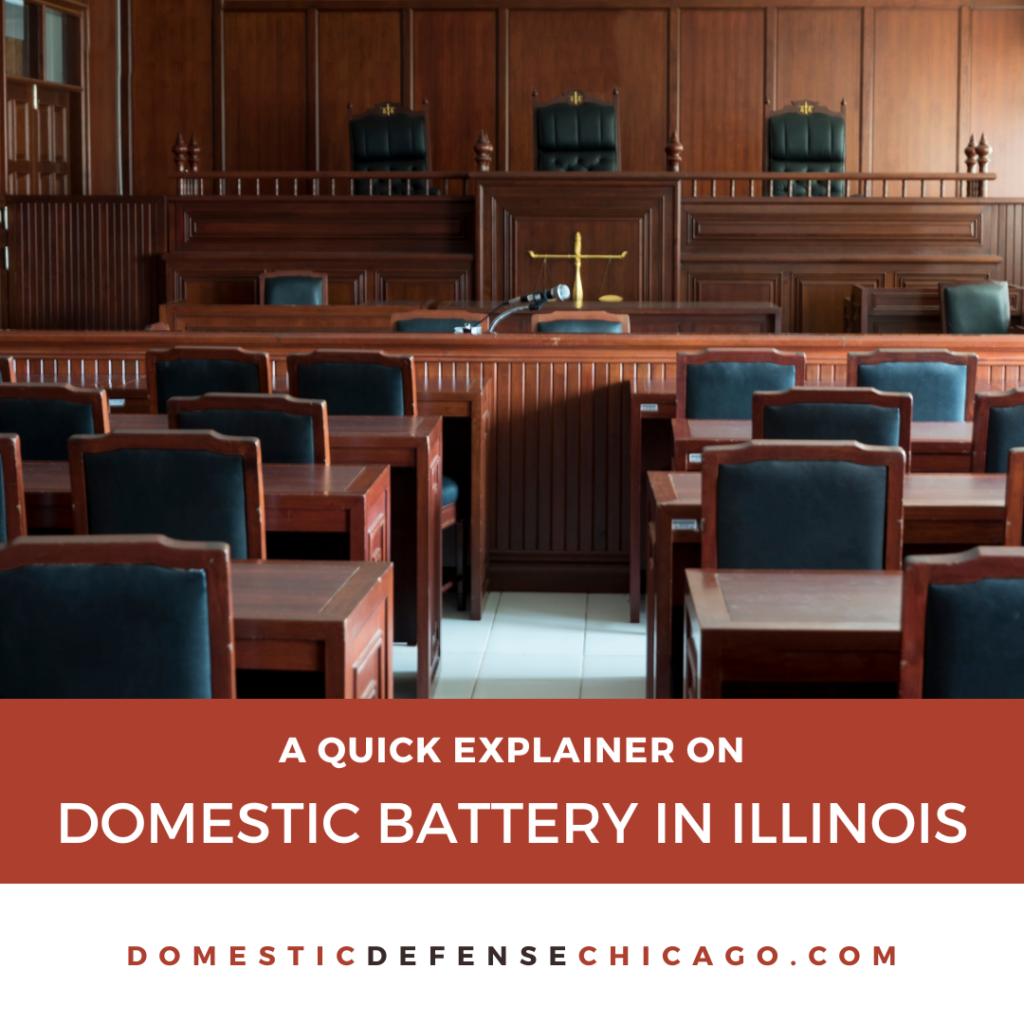In Illinois, domestic battery is a serious offense with far-reaching consequences. It’s a term that encompasses more than just physical violence between spouses. This guide will break down what constitutes domestic battery in Illinois, the potential penalties, and the legal nuances that can affect the outcome of such cases. Whether you’re seeking information for yourself or someone you know, understanding the intricacies of domestic battery laws in Illinois is the first step toward navigating the legal system effectively.
Domestic Battery in Illinois, Explained
This guide covers:
- The legal definition of domestic battery in Illinois
- Penalties and consequences of a domestic battery conviction
- The difference between domestic battery and aggravated domestic battery
- Impact of domestic battery charges on divorce and custody
- How to defend against a domestic battery charge
Here’s a closer look at each.
The Legal Definition of Domestic Battery in Illinois
Domestic battery in Illinois is legally defined under the Illinois Domestic Violence Act. It involves knowingly causing bodily harm to any family or household member or making physical contact of an insulting or provoking nature with a family or household member. The scope of who can be considered a family or household member is broad. It includes individuals related by blood or marriage, people who are or have been married, those who share or allegedly share a child in common, individuals who live together or have lived together, and even those in dating or engaged relationships. Understanding this definition is crucial because it determines the legal approach and the potential defenses in such cases.
Penalties and Consequences of a Domestic Battery Conviction
The penalties for a domestic battery conviction in Illinois are designed to be deterrents and can have a lasting impact on the life of the accused. A first-time offense without aggravating factors is typically charged as a Class A misdemeanor. This can lead to up to one year in jail, fines up to $2,500, and mandatory completion of a domestic violence intervention program. If the individual has prior convictions for domestic battery or if the incident involved other aggravating factors, the charge can be elevated to a felony. Felony convictions carry stiffer penalties, including longer jail sentences, higher fines, and the possibility of losing certain civil rights, such as the right to possess firearms. The long-term consequences also include having a criminal record, which can affect employment, housing, and social relationships.
The Difference Between Domestic Battery and Aggravated Domestic Battery
Understanding the difference between domestic battery and aggravated domestic battery is essential for anyone facing these charges. Aggravated domestic battery involves more serious circumstances, such as causing great bodily harm, permanent disability, disfigurement, or committing an act of strangulation. In Illinois, this offense is classified as a Class 2 felony. The penalties for aggravated domestic battery are more severe, with potential prison sentences ranging from 3 to 7 years. Additionally, if the accused has prior convictions of domestic battery or other violent crimes, the penalties can increase significantly, including extended prison terms and larger fines.
Impact of Domestic Battery Charges on Divorce and Custody
When domestic battery charges intersect with divorce and custody proceedings, the stakes are particularly high. A conviction for domestic battery can be a critical factor in divorce proceedings, potentially influencing the court’s decisions on the division of marital assets, spousal support, and even the awarding of attorney’s fees. In custody matters, the court’s primary concern is the best interest of the child, and a domestic battery conviction can lead to a presumption that the convicted party is not fit to have custody or unsupervised visitation rights. The court may require supervised visitation or order that visitation be contingent upon completing a treatment program.
How to Defend Against a Domestic Battery Charge
Defending against a domestic battery charge in Illinois requires a nuanced legal strategy tailored to the specifics of the case. A defense might be built around demonstrating that the accused acted in self-defense, that the contact was not of an insulting or provoking nature, or that the accusations are false. In some cases, it may be possible to question the credibility of the accuser or the legality of how evidence was obtained. A knowledgeable lawyer will thoroughly investigate the circumstances, interview witnesses, and gather evidence to support the defense. They will also navigate the complexities of the legal system to advocate effectively for the accused’s rights and work towards the best possible outcome, whether that means a case dismissal, acquittal, or reduced charges.
FAQ About Domestic Battery in Illinois
Check out these commonly asked questions about domestic battery in Illinois. If you don’t see the answers here, please call our office and we’ll get you the information you need.
What Should I Do Immediately After a Domestic Battery Arrest?
After a domestic battery arrest, it’s crucial to remain silent and request a lawyer. Anything you say can be used against you, so it’s important to have legal representation before making any statements.
How Can Charges of Domestic Battery Be Dropped?
Charges may be dropped if the prosecutor believes there is insufficient evidence to convict or if the alleged victim recants their statement. However, the decision ultimately lies with the prosecutor, not the alleged victim.
Is It Possible to Get a Domestic Battery Charge Reduced?
A charge may be reduced as part of a plea bargain, especially if it’s a first offense and there are mitigating circumstances. Your lawyer can negotiate with the prosecutor on your behalf.
Can a Domestic Battery Conviction Be Sealed or Expunged?
In Illinois, a domestic battery conviction cannot be expunged from your record, but in some cases, it may be sealed. Consulting with a lawyer is essential to explore your options.
What Are the Long-Term Effects of a Domestic Battery Conviction?
A conviction can affect employment, housing, and educational opportunities. It can also impact your reputation and personal relationships for years to come.
What Is Considered Physical Contact of an Insulting or Provoking Nature?
Physical contact of an insulting or provoking nature is any contact that does not cause bodily harm but is offensive or intended to provoke a physical response. This can include actions like spitting, shoving, or any unwanted touching.
Can Charges Be Dropped If the Alleged Victim Does Not Press Charges?
In Illinois, the decision to proceed with domestic battery charges is ultimately up to the prosecutor, not the alleged victim. Even if the alleged victim chooses not to press charges, the state can still pursue the case based on the evidence.
What Are the Legal Defenses to Domestic Battery?
Legal defenses to domestic battery can include lack of intent to cause harm, self-defense, defense of others, false accusations, or lack of evidence to prove the charges beyond a reasonable doubt. The appropriate defense will depend on the specific facts of the case.
How Can a Domestic Battery Conviction Affect Future Employment?
A domestic battery conviction can significantly affect future employment prospects, especially in fields that require background checks or involve working with vulnerable populations. It may also impact professional licensing and certifications.
Understanding domestic battery laws in Illinois is crucial for anyone facing such charges or involved in a situation where these charges may apply. With the right legal guidance, those accused can navigate the system more effectively and work toward a more favorable outcome.
Do You Need to Talk to an Attorney About Domestic Battery Defense?
If you need to talk to a domestic battery defense attorney in Illinois, we’re here to help. Call us at 847-920-4540 now – we’ll be happy to give you a free consultation and talk to you about your options.







Leave A Comment
You must be logged in to post a comment.